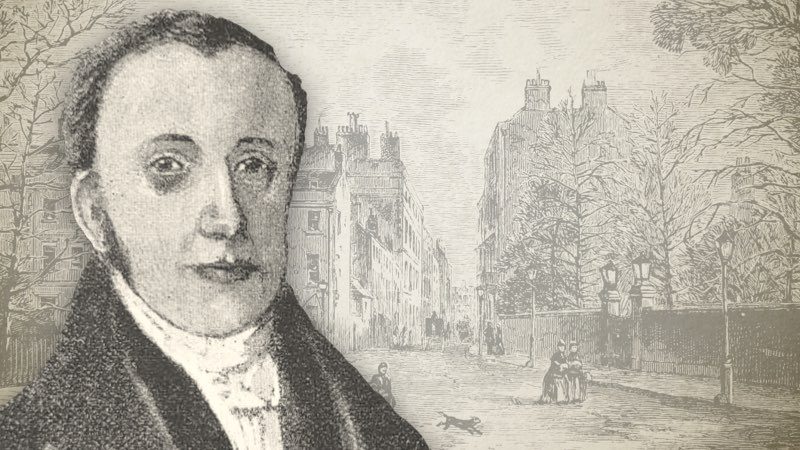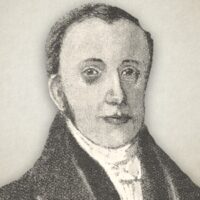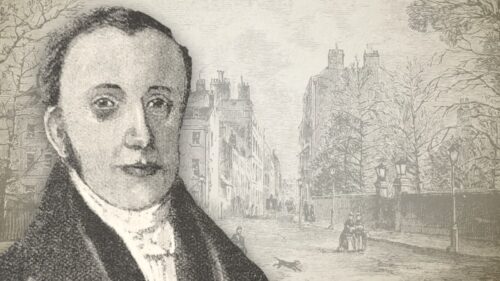
The Solitary Church
[A Sermon Preached By The Rev. Richard Hale, A.M. At Harewood Church, On Sunday, July 18, 1852]
“God setteth the solitary in families; he bringeth out those which are bound with chains: but the rebellions dwell in a dry land.”—Psalm 68:6
It is worthy of remark that though God, as he went on in his work of creation for five days, and had pronounced each day’s work good, yet it was not till the sixth day, after he had made man, the master-piece of his creation, that he said it was very good. “And God saw everything that he had made, and, behold, it was very good” (Gen. 1:31). Yea, this first man was very good, for he was created in the image of God,—that is, he bore resemblance to God in this, that he was perfectly pure, and free from sin; but, alas, this did not last long, he soon lost it by committing sin! The apostle says, “Sin is the transgression of the law;” and again, “where no law is there is no transgression” (I John 3:4).
It follows, then, that God did give a law to Adam, for, otherwise, he could not have sinned, and that he sinned by breaking the law,—he did what God had forbidden, and stood before him a sinner: and by this original sin of Adam, as it is called, he exposed himself and all his posterity to eternal death, for so God had decreed, that death should be the wages of sin (Rom. 6:23): that this was the case, appears by the works of the apostle Paul, for he says, “By one man’s disobedience, many were made sinners” (Rom. 5:19); “By one man sin entered into the world, and death by sin, and so death passed upon all men, for that all have sinned” (Rom. 5:19).
This original sin of Adam, as it has extended to the whole world, including infants, is spoken of as the sin of the world. But I venture to think that Christ has, by the atonement he has made for it, taken it away, so that infants are freed from it; and that the apostle John was directed by the Holy Ghost to proclaim this good news, the first time he saw Christ in the flesh, when he exclaimed, “Behold the Lamb of God, which taketh away the sin of the world” (John 1:29). But of those that survive infancy the case stands different, they are sinners by actual transgression of the law of God, for it is written, “there is no man that sinneth not” (Eecles. 6:20). And the apostle John, when writing to the children of God, says, “If we say that we have no sin, we deceive ourselves, and the truth is not in us” (1 John 1:8).
So, then, it is plainly revealed to us in the word of God, that you and I are sinners, exposed to eternal death, the wages of sin,—sinners by transgression of the law of God; for the law requires an obedience to it, which, by reason of the corrupt nature we inherit from Adam, we cannot give to it: and yet the law makes no allowance for our weakness to obey it, for the apostle says, “Cursed is every one that continueth not in all things which are written in the book of the law to do them” (Gal. 3:10).
You and I then, my friends, are sinners in common with the rest of Adam’s posterity, by disobedience to the law of God, which we have never kept one day, or one hour of the day, and we are, therefore, exposed to its curse death eternal. Moreover, as the sons of fallen Adam, we are described in the word of God, as being by nature in bondage to sin, as loving it, and as enemies to God, manifested by wicked works. We are described as being in bondage to the devil, whom St. Paul represents as a mighty prince, ruling over mankind while in their nature state; he calls him “the prince of the power of the air, the spirit that now worketh in the children of disobedience” (Eph. 2:2). Nay, he speaks of him as “the God of this world, who blinds the minds of them that believe not, lest the light of the glorious gospel of Christ should shine unto them” (2 Cor. 4:4). And his subjects are described by the prophet Isaiah as prisoners sitting in darkness in the prison-house (Isaiah 42:7); and by David, in my text, as bound with chains:” that is, as if tied and bound with their sins, as with chains; nor have they any will or power to be loosed from these chains while in their nature state.
Now, my friends, if I had preached thus far to a congregation who had never heard the Gospel, it may well be supposed they would exclaim, “If this be so, then will any be saved, and how saved?” and the answer might be given in the beautiful language of our own scriptural seventeenth article, which declares that “God has constantly decreed by his counsel, secret to us, to deliver from curse and damnation those whom he hath chosen in Christ out of mankind, and to bring them by Christ to everlasting salvation, as vessels made to honour.” It is plainly implied in this article (every word of which I believe), that God had a foreknowledge of the fall of Adam, and therefore chose some of his posterity in Christ, and promised him for them, a better life than what Adam would lose by his disobedience, a spiritual life here, which Adam had not, for he was but a natural man, and a life in glory, which even Adam’s obedience could not have gained for them. This Christ proclaimed, when he said, “I am come that they might have life, and that they might have it more abundantly” (John 10:10); for the life promised on Adam’s obedience, was only a never-ending life on earth, with temporal blessings. And St. Paul fully confirms this doctrine in his epistle to some of these favoured people then living at Ephesus, saying, “God hath chosen us in Christ before the foundation of the world” (Eph. 1:4). Being chosen in Christ, and thus forming one mystic body with him, they are counted as God’s children by adoption; and God, in his own good time, lets them know it, by sending forth the Spirit of Christ into their hearts, as Paul says to the children in Galatia, “Because ye are sons, God hath sent forth the Spirit of his Son into your hearts, crying, Abba, Father” (Gal. 4:6). ‘The Holy Ghost, too, is a witness to them of their adoption, as St.Paul says to those at Rome, “The Spirit itself beareth witness with our spirit, that we are the children of God” (Rom. 8:16).
Well, then, some of Adam’s sons will be saved, for they form one mystic body with Christ, and God proclaimed it by the prophet Hosea, saying, “I will save them by the Lord their God” (Hosea 1:7),—that is, by Christ, our God with the Father (John 10:30). But how, or in what way, saved by Christ, never could have entered the thought of man, if God had not revealed it in his word. St. Paul says, “Great is the mystery of godliness, God was manifest in the flesh, justified in the Spirit, seen of angels, preached unto the Gentiles, believed on in the world, received up into glory” (I Tim. 3:16). The infinite wisdom of God devised this wonderful scheme, that his Son should assume the human nature in order to save his adopted children. Indeed, the nature he was to assume was that common to all the sons of Adam, but was assumed for the children’s sake, as Paul says, “Forasmuch as the children are partakers of flesh and blood, he also himself likewise took part of the same” (Heb. 2:14.)
And this wonderful scheme of God’s devising for the salvation of his beloved people, amounted to this, that he should work out for the family a perfect sinless righteousness, agreeable to all the spiritual requirements of his law; that it might be imputed to them, or put to their account; and then suffer the penalty of the law—death,—in their room and place, as an atonement for their sins; and no sooner did Christ consent to perform this great work, given him to do, saying, “Lo, I come to do thy will, O God,”—then thus early, the Father transferred all their sins to Christ; and the prophet Isaiah, speaking for them by the teaching of the Holy Ghost, proclaimed the glorious news some eight hundred years before Christ came, saying, “The Lord hath laid on him the iniquity of us all” (Isaiah 53:6); and then by another prophet, saying, “The iniquity of Israel shall be sought for, and there shall be none; and the sign of Judah, and they shall not be found” (Jer. 1:20). Then the prophet, speaking for the church, proclaims her full justification in God’s sight, saying, “I will greatly rejoice in the Lord: my soul shall be joyful in my God; for he hath clothed me with the garments of salvation; he hath covered me with the robe of righteousness” (Isiah 61:10). I believe the family were justified before the world was made, for in the mind of God, things future are as if already done; hence we find the prophet Isaiah speaking some eight hundred years before Christ came, “He was wounded for our transgression, he was bruised for our iniquities, the chastisement of our peace was upon him, and with his stripes we are healed” (Isaiah 53:5). Again, it is written, “The Lord knoweth them that are his” (2 Tim. 2:19); he must needs know them, for they were all registered in the book of his remembrance before they were born; for so Christ speaks to his divine Father, saying, “in thy book were all my members written, which, day by day, were fashioned, when as yet there was none of them” (Ps. 139:16). And as he knows their persons, so he knows their dwellings, and where to find them, as it is written, “He hath determined the times before appointed, and the bounds of their habitation” (Acts 17:26); accordingly, when the appointed time is come, the “set time,” as it is called (Ps. 102:13), then the prophecy of Christ is fulfilled, that be should open the blind eyes, and bring out the prisoners from the prison, and them that sit in darkness, out of the prison-house” (Isaiah 42:7): and for that end he sends forth the glorious Gospel, “the rod of his strength” (Ps. 110:2); and by this instrument, as my text says, he bringeth out those that are bound with chains,” brings them, his people, out of the kingdom of Satan (who had led them captive at his will) into the kingdom of his dear Son; so says Paul, in his epistle to the Colossians 1:13: “Who hath delivered us from the power of darkness, and hath translated us into the kingdom of his dear Son.” It is by this instrument they are born again, and not by baptism; for many baptized ones are still in the prison; the apostle Peter, addressing the scattered strangers to whom he sends his epistle, speaks of them as “being born again, not of corruptible seed, but of incorruptible, by the word of God, which liveth and abideth for ever” (1 Pet. 1:23). By the gospel, which is Christ’s voice, he brings his family (his sheep) to him for salvation, according to his promise, “they shall hear my voice, and there shall be one fold, and one shepherd” (John 10:16): and there is nothing of chance or accident in this. “All that the Father giveth me shall come to me, and him that cometh to me I will in no wise cast out” (John 6:37). When Christ sent the apostle Paul to preach the gospel to the Gentiles, it was with these words, “I now send thee to the Gentiles, to open their eyes, to turn them from darkness to light, and from the power of Satan unto God, that they may receive forgiveness of sins, and inheritance among them which are sanctified by faith that is in me” (Acts 26:18).
Oh, it is a memorable day for each individual of God’s adopted children, when the Gospel is thus blessed to them, for they are then brought out from bondage to sin, the law, and death eternal, and are Christ’s free men, as he himself said to his disciples, “If the Son shall make you free, ye shall be free indeed” (John 8:36); and then, as St. Paul says, “they are delivered from the bondage of corruption into the glorious liberty of the children of God” (Rom. 8:21); not only from bondage to their sinful lusts, but to Satan, the god of this world, so that he can no longer lead them captive at his will. Sin, which is a transgression of the law, has no longer dominion or power over them, to bring them under its curse—death,—and Paul gives the reason for it, saying to them, “Sin shall not have dominion over you, for ye are not under the law, but under grace” (Rom. 6:14); and the apostle Paul says in another place, “Christ hath redeemed us from the curse of the law, being made a curse for us” (Gal. 2:13).
Henceforth they walk not as others walk, or as they once walked; seeking how to gratify the flesh, for they are under the influence of Divine grace, and walk under the influence of the Spirit of Christ; and thus it becomes manifest to others that they are Christ’s free men, freed from all condemnation, as St. Paul says, “There is, therefore, now no condemnation to them that are in Christ Jesus, who walk not after the flesh, but after the Spirit” (Rom. 8:1); then they are no longer of the world, and in return are hated by the world, as Christ said to them, “If the world hate you, ye know that it hated me before it hated you” (John 15:18, 19).
Then, as it respects the world, they become a solitary people, living separate from the men of it, and are ridiculed by them, and are, as the Poet says,
“Like owls that fly by day,
Mocked and wondered at!”
It is the Lord’s work. “I will take you one of a city, and two of a family, and I will bring you to Zion” (Jer. 3:14). Yet, in one sense, they are not alone, for being taught of God to love one another, they get together and enjoy the communion of saints: and what think you is the subject of their conversation? they talk of the Lord, and of his dealings with them, and of his grace bestowed upon them, and the Lord has made a sweet promise to such by his prophet Malachi: “Then they that feared the Lord spake often one to another, and the Lord hearkened and heard it, and a book of remembrance was written before him, for them that feared the Lord, and that thought upon his name. And they shall be mine, saith the Lord of Hosts, in that day when I make up my jewels; and I will spare them, as a man spareth his own son that serveth him” (Mal. 3:16).
If the Gospel, the word of truth, is as Christ himself called it, his voice (John 10:27), then he is in it when preached by ministers called and sent by him to preach it to his people, his people Israel, and he has given them some sweet promises to cheer them in their work, that by means of it he will be to his people what the night dew is in hot countries, making the earth fruitful; and as rain upon the grass: turn to Hosea 14:5, “I will be as the dew unto Israel;” also to the 32:2, “My doctrine shall drop as the rain, my speech shall distil as the dew, as the small rain upon the tender herb, and as the showers upon the grass.”
But what will become of the rebellious? those who live and die in rebellion against God, his word, and laws? Oh, the Gospel has no effect upon them, they resemble a dry and barren land where no water is, as God said of the mountains of Gilboa by his servant Samuel, “Ye mountains of Gilboa, let there be no dew, neither let there be rain upon you” (2 Sam. 1:21). It is an awful subject: turn to Isaiah 27:11, where the prophet describes them as a people of no understanding, “therefore he that made them will not have mercy on them, and he that formed them will shew them no favour.”
May the Lord bless this portion of his word this day, for the gathering out some of his hidden ones, or for the refreshment and edification of some of his already called ones, and to him shall be all the praise.
Richard Hale (1773-1854) was an Anglican High-Calvinist preacher. He served for many years as Vicar of Harewood.




